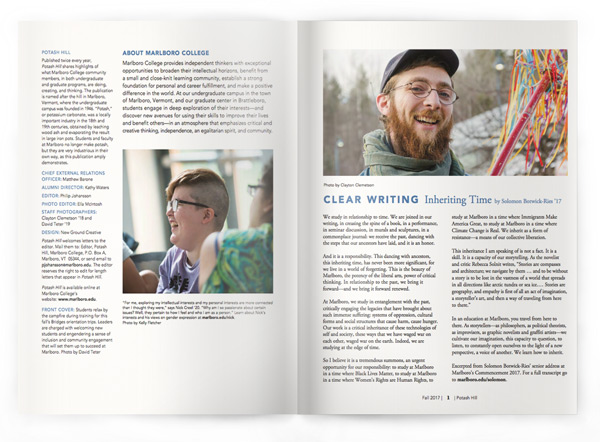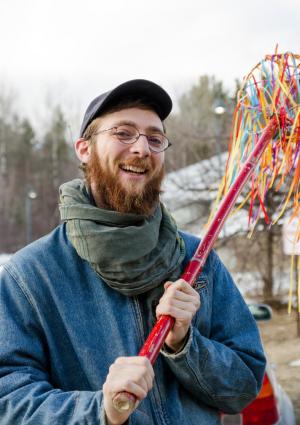Clear Writing

Inheriting Time
by Solomon Botwick-Ries ’17
 We study in relationship to time. We are joined in our writing, in creasing the spine of a book, in a performance, in seminar discussion, in murals and sculptures, in a commonplace journal: we receive the past, dancing with the steps that our ancestors have laid, and it is an honor.
We study in relationship to time. We are joined in our writing, in creasing the spine of a book, in a performance, in seminar discussion, in murals and sculptures, in a commonplace journal: we receive the past, dancing with the steps that our ancestors have laid, and it is an honor.
And it is a responsibility. This dancing with ancestors, this inheriting time, has never been more significant, for we live in a world of forgetting. This is the beauty of Marlboro, the potency of the liberal arts, power of critical thinking. In relationship to the past, we bring it forward—and we bring it forward renewed.
At Marlboro, we study in entanglement with the past, critically engaging the legacies that have brought about such immense suffering: systems of oppression, cultural forms and social structures that cause harm, cause hunger. Our work is a critical inheritance of these technologies of self and society, these ways that we have waged war on each other, waged war on the earth. Indeed, we are studying at the edge of time.
So I believe it is a tremendous summons, an urgent opportunity for our responsibility: to study at Marlboro in a time where Black Lives Matter, to study at Marlboro in a time where Women’s Rights are Human Rights, to study at Marlboro in a time where Immigrants Make America Great, to study at Marlboro in a time where Climate Change is Real. We inherit as a form of resistance—a means of our collective liberation.
This inheritance I am speaking of is not a fact. It is a skill. It is a capacity of our storytelling. As the novelist and critic Rebecca Solnit writes, “Stories are compasses and architecture; we navigate by them … and to be without a story is to be lost in the vastness of a world that spreads in all directions like arctic tundra or sea ice.… Stories are geography, and empathy is first of all an act of imagination, a storyteller’s art, and then a way of traveling from here to there.”
In an education at Marlboro, you travel from here to there. As storytellers—as philosophers, as political theorists, as improvisers, as graphic novelists and graffiti artists—we cultivate our imagination, this capacity to question, to listen, to constantly open ourselves to the light of a new perspective, a voice of another. We learn how to inherit.
Excerpted from Solomon Botwick-Ries’ senior address at Marlboro’s Commencement 2017. See a full transcript.
Photo by Clayton Clemetson
